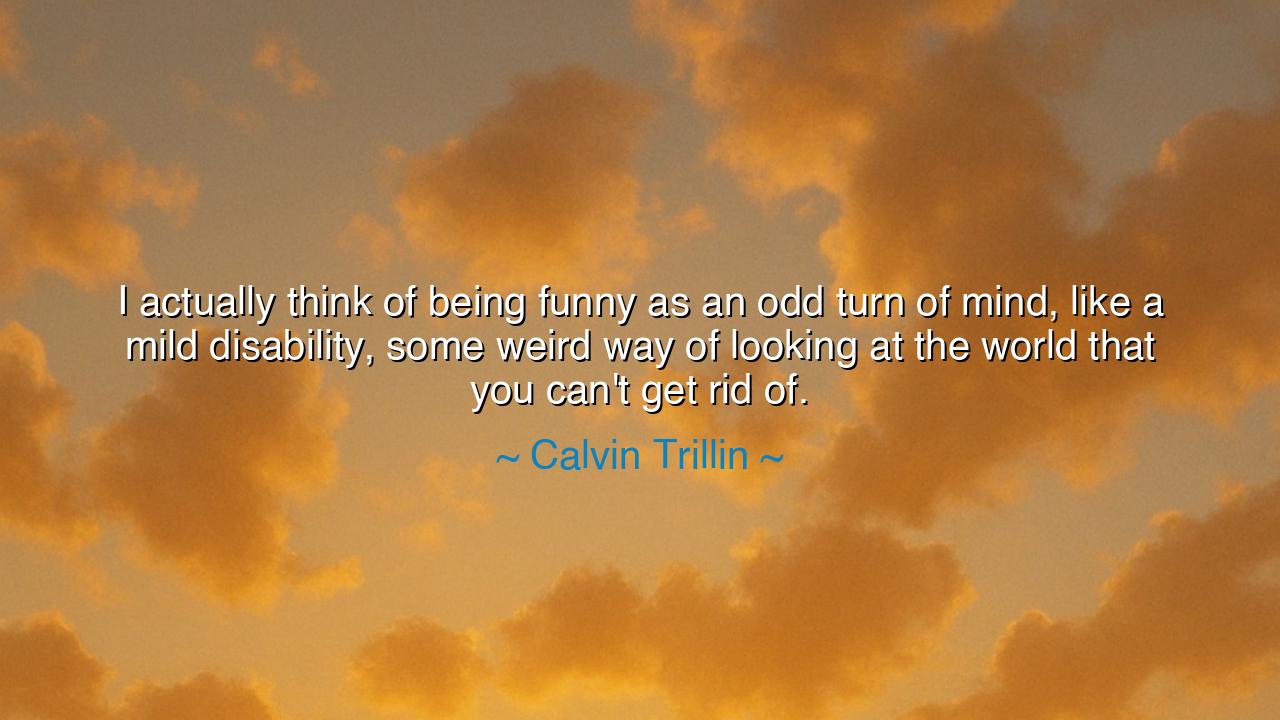
I actually think of being funny as an odd turn of mind, like a
I actually think of being funny as an odd turn of mind, like a mild disability, some weird way of looking at the world that you can't get rid of.






“I actually think of being funny as an odd turn of mind, like a mild disability, some weird way of looking at the world that you can’t get rid of.” — so spoke Calvin Trillin, a man whose words often danced on the thin line between wit and wisdom. In this confession lies a truth both humble and profound: that humor is not always a choice, but a lens — an involuntary way of perceiving the world, equal parts burden and gift. It is a crooked mirror through which reality becomes bearable, and pain, for a fleeting moment, becomes art.
In ancient days, the poets and prophets knew that the fool and the seer were often one and the same. To see the world differently — to find laughter where others see sorrow — is to live on the edge of revelation. The funny man is not simply a jester; he is a philosopher cloaked in jest, one who transforms grief into gold. Trillin’s words reveal that being funny is not the pursuit of amusement, but the result of a mind twisted gently by empathy and observation — a mind that cannot unsee absurdity even in tragedy. It is, as he says, a “mild disability,” not because it weakens, but because it isolates.
Consider the life of Mark Twain, whose humor carried the soul of America through an age of contradiction. He made the world laugh, yet his own heart carried the ache of loss and disillusionment. He saw too much, felt too deeply, and so wrapped truth in laughter — the only garment light enough to bear its weight. Twain’s wit was not a mask but a method of survival, a way to speak of injustice without drowning in despair. This is the essence of Trillin’s thought: that the comic spirit is born not from shallowness but from the depth of perception, a mind forever tilting between comedy and sorrow.
When Trillin speaks of this as a “weird way of looking at the world,” he acknowledges the strangeness of those who laugh first where others mourn. Such souls live in double vision. They see both the tragedy and the irony in the same moment. To them, life is a theater — grand, chaotic, filled with error — and to survive it, one must learn to smile at the curtain’s fall. The ancients called this divine madness, a sacred form of insight that frees one from illusion. For to find humor in the human condition is to accept its imperfection — and thus, to love it more completely.
This “mild disability,” as Trillin names it, may seem a curse to those who carry it, for they cannot shut their eyes to folly. Yet it is through this very affliction that they serve humanity. They remind the solemn world not to take itself too seriously. Like jesters in royal courts, they speak truth disguised as laughter, piercing the armor of pride with the gentlest of arrows. In the laughter they evoke, hearts are unburdened, and souls are reminded of their shared frailty. Thus, what begins as an oddity becomes a quiet form of healing.
Let this saying, then, be understood as both warning and blessing. To possess such a turn of mind is to live apart — to find amusement in the storm, and to find storms within amusement. But it is also to carry light where others carry despair. The ancients would call this the wisdom of paradox: that weakness can be strength, that laughter can be prophecy. For in every age, those who can laugh at the darkness are the ones who keep the fire alive.
And so, the teaching is this: cherish your strangeness. If you are one who sees the absurd, do not curse your vision. Nurture it as you would a fragile flame. Use your humor not to wound, but to awaken; not to hide, but to reveal. For the world will always need such souls — the quietly afflicted, the oddly perceptive, the ones who turn pain into laughter and laughter into truth. They are the keepers of balance between sorrow and joy, between madness and meaning. And in that balance, as Trillin reminds us, lies the deepest kind of wisdom — the wisdom of the funny mind, forever seeing the world just a little askew, and thereby seeing it most clearly of all.






AAdministratorAdministrator
Welcome, honored guests. Please leave a comment, we will respond soon